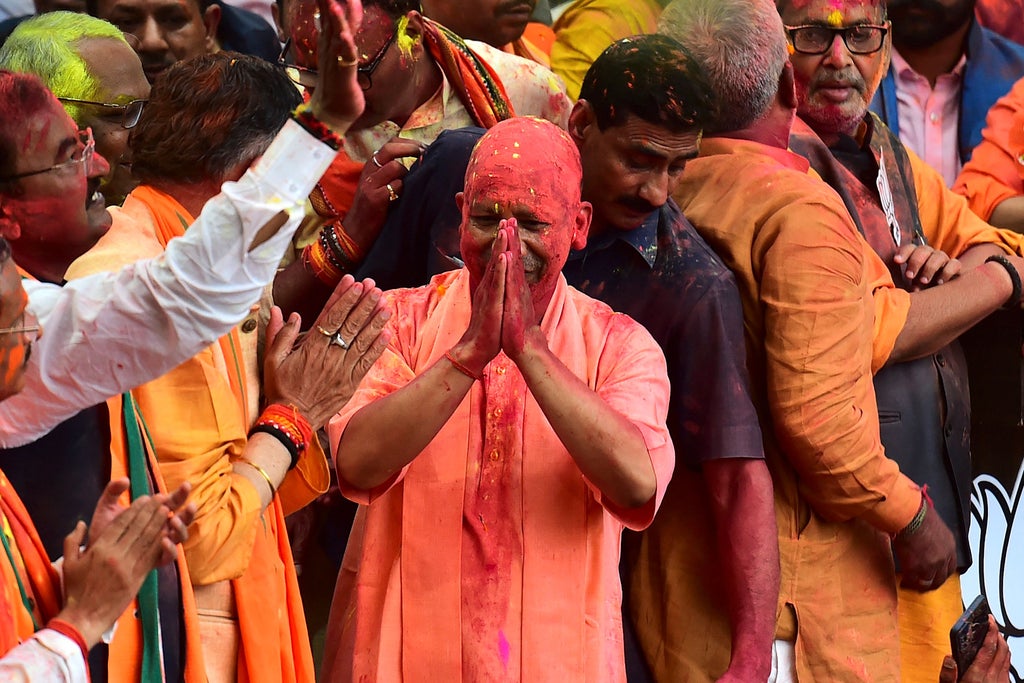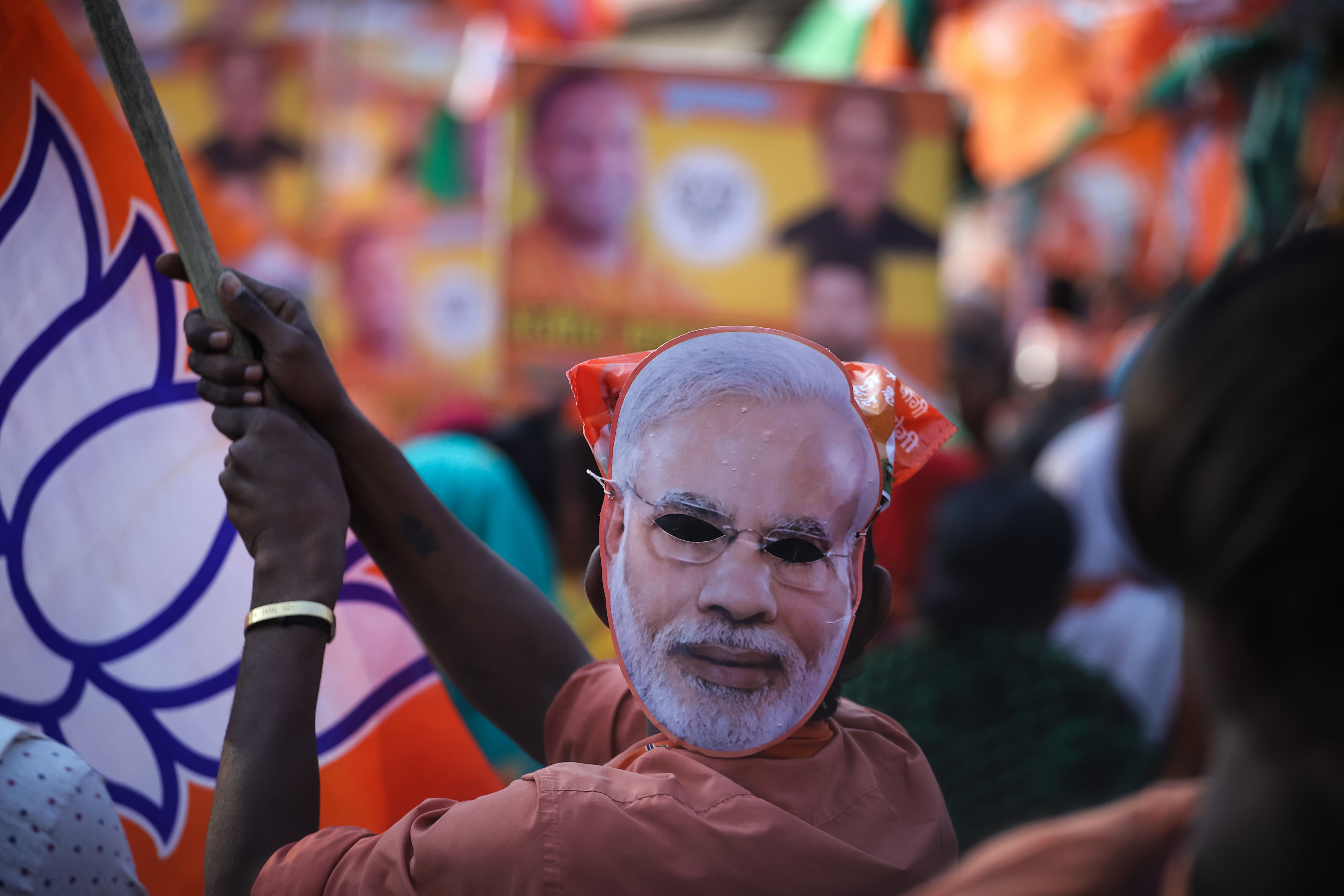
Dressed in saffron robes, the hardline monk-turned politician and leader of India’s most populous state, Yogi Adityanath entered the stage in Lucknow to mark his victory in the state elections on Thursday surrounded by supporters chanting “Jai Shri Ram” [Hail Lord Ram].
Adityanath, who is the first chief minister of UP to retain a second term in 37 years, marked the occasion by applying gulaal (colour powder), a ritual for the Hindu festival of Holi, days before the festival as he stood on stage, joining hands with his ministers in a show of unity.
Narendra Modi’s Hindu nationalist Bharatiya Janata Party (BJP) won the state, home to more than 220 million people and more voters than in the country of Brazil, with 255 seats out of 403, well above the number required for an outright majority. Although this is 57 seats down from the landslide victory the party recorded five years ago.
Nonetheless the victory sparked celebrations across the major cities of the state, with party workers riding bulldozers to their party offices to chants of “Jai Shri Ram”, a slogan that has become synonymous with BJP victory parades in recent years. Other chants hailed Adityanath’s role in the win, such as: “UP mein rehna hai to Yogi-Yogi kehna hai [follow ‘Yogi’ if one has to live in UP].”
This is a modified version of a slogan Adityanath’s supporters have been chanting since he was elected as a member of the legislative assembly in 1998, and has won five consecutive terms since then.
In the last five years of BJP rule in UP, Adityanath has consistently pursued policies that appeal to his Hindu nationalist base. He has changed the names of places including cities like Allahabad and Mughal Sarai to more Hindu-sounding ones, such as Prayagraj and Deen Dayal Upadhyaya. He banned the slaughter of cows, an animal that is holy to Hindus, and also introduced a law against “love jihad”, a conspiracy theory among right-wing Hindus that Muslim men deceive women to coerce them into changing their religion.
Adityanath’s victory comes following alarm calls over the decline of secularism in India and the rise of Hindutva politics, and in spite of a horrific Covid-19 pandemic and massive farmers’ protests that analysts might have expected to play against the incumbent. When India’s healthcare system was brought to its knees last summer, dead bodies were seen floating down the rivers of Adityanath’s state.
The result has been credited to Adityanath’s crackdown on crime and his high popularity among Hindu nationalists, despite UP having a large Muslim demographic of around 20 per cent of the population. It is a victory that will dramatically increase talk among the BJP faithful about Adityanath as a potential successor to Modi.
These state elections, with UP voting alongside four other states, were seen as an important test for the BJP ahead of the general elections in 2024 when Modi will be vying for a third term. And the results were particularly devastating for India’s once-formidable National Congress party, the country’s oldest political party and the main national opposition to the BJP.

Manisha Priyam, a professor and political analyst who has been tracking the BJP’s rise for years, says the thumping win in a crucial state like UP “certainly makes Mr Yogi very powerful within the BJP, with no other competitor in sight”.
“Uttar Pradesh is a very significant state and it is large in size, the politics of UP definitely has an impact on other neighbouring states,” Priyam says.
“The BJP may have lost its heavy majority but it’s still a comfortable win,” says Maya Mirchandani, a fellow with the Observer Research Foundation think-tank. “So there’s no question that this is being seen as a win for Yogi Adityanath.”
Mirchandani says she saw a “somewhat lower participation” from Modi himself in the UP campaign than expected, with the prime minister normally playing a key role as the party’s most popular and important vote-winner.
“Across the rest of the country, we have seen it has always been about the charisma of prime minister Modi that kind of wins over chief ministerial candidates on the field,” she says. “But I think in UP there was a realisation that Mr Yogi himself has a strong following and a lot of his electorates see him as a natural leader.”
In an interview with Reuters before the elections, Adityanath refused to answer a question on whether he should be looked at as a successor.
“I am just a monk,” he said, adding: “I will serve the people of the state till the party wants or else I will serve people through my … temple.”
BJP spokespersons also refused to comment to The Independent on the future of Adityanath in the party.
Right after the election results were announced on Thursday, BJP member Aparna Yadav said that the party has received support from all the religious communities in Uttar Pradesh.
“Hindu-Muslim-Sikh-Isai Sabke Sab Hein Bhaajpayee [BJP is with everyone, every religion],” she said.
It’s a message of communal harmony that is at odds with the reality of Adityanath’s almost three-decades-long political career and his five-year rule in the state. The 49-year-old is the poster child for the most hardline brand of Hindutva politics that has come to dominate the country in recent years, and as such represents a deeply divisive figure.
He heads a key Hindu temple in eastern UP’s Gorakhpur, the Gorakhnath Math, a position he has held since the death of his spiritual “father”, Mahant Avaidyanath, in September 2014.
He also ran a private Hindu militia organisation called Hindu Yuva Vahini (Hindu youth army) that works toward religious causes like protecting cows and preventing “forced religious conversions” and “love jihad”, both of which target Muslims as alleged perpetrators. Its activists have been accused of converting minor local incidents into communal conflagrations.
Before taking over as chief minister, Adityanath made several controversial speeches against the country’s Muslim minority. He once said non-Muslims are “not safe in Muslim majority areas” in the state and warned against “converting western UP into Kashmir (India’s only region where Muslims are in the majority)” after a spell of rioting there.
His tone did not entirely change after taking over charge of a multi-cultural state. Just a few weeks before the elections, Adityanath said that “80 per cent people are with BJP and 20 per cent always oppose us”, taken as a clear reference to the state’s religious demographics. He nonetheless later denied this, saying the comment was not “in the context of religion or caste” in an interview with Indian news agency ANI.
Analysts say Adityanath’s controversial statements did not harm him at the ballot box because they play to a deep communal divide that exists among the state’s voters – Thursday’s result suggesting that in UP at least, a majoritarian appeal can translate to an emphatic election victory.







